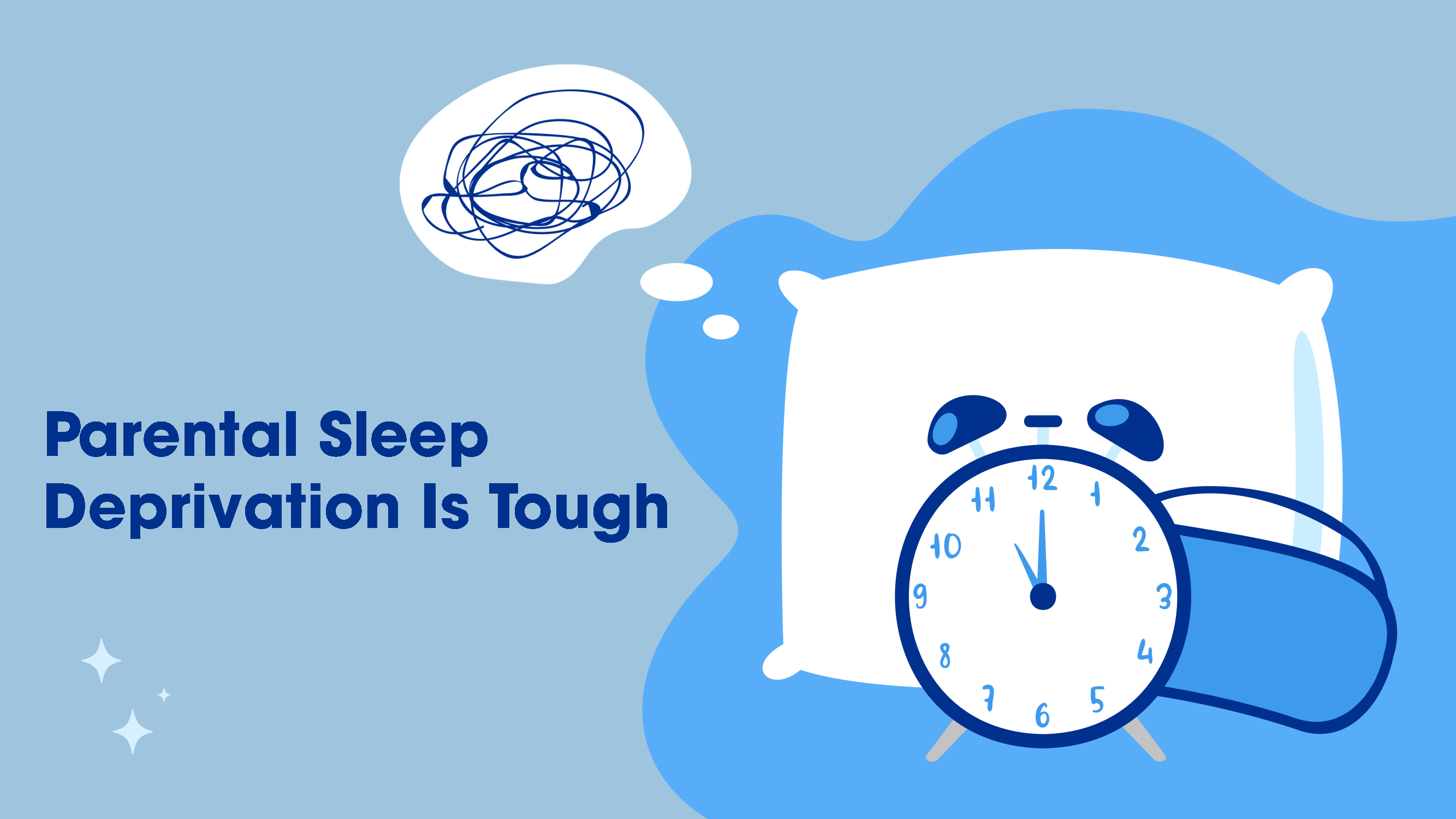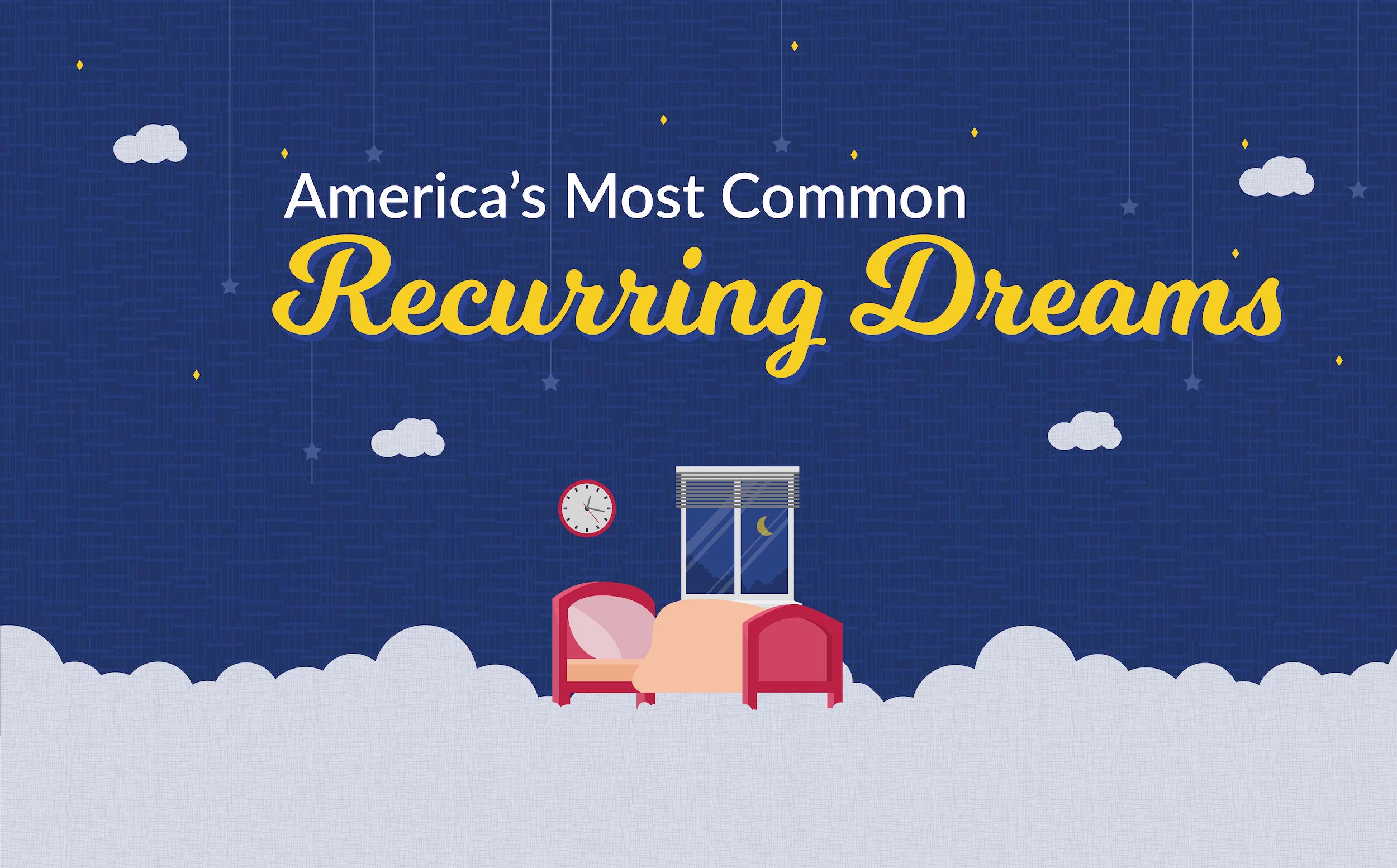
Key Takeaways
- Sleep Patterns Across Family Size: Parents generally manage to get the recommended amount of sleep, despite the number of children at home. Mothers tend to have slightly more sleep-related activity than fathers, potentially due to multitasking demands. While fathers with multiple children report slightly less sleep-related activity, no such trend is observed among mothers, suggesting that meeting the demands of several children may necessitate sufficient rest for parents.
- Sleep Dynamics Based on Age Ranges: Sleep disruption is particularly common when children are younger, especially during the first year. Parents of both genders experience sleep deprivation during this time. However, parents of older children generally tend to sleep longer. Notably, the age of the child has relatively little effect on the sleep-related activity of mothers and fathers.
- Work and Financial Impact on Sleep: Employment appears to significantly impact parental sleep patterns, with working parents reporting less sleep-related activity than those without jobs. Multiple job holders, in particular, tend to get less sleep on average, emphasizing the trade-off between work obligations and rest. Interestingly, the study indicates that parents with lower incomes often get more sleep-related activity than those with higher incomes.
For parents of newborn children, sleep is a notoriously scarce commodity: Babies’ sleep schedules are anything but steady, forcing new moms and dads to squeeze in shut-eye whenever possible. But the plight of parents doesn’t end there.
From toddlers to teenagers, kids of all ages cause parents to forego rest they would otherwise enjoy. For many families, this dynamic has serious consequences. Studies suggest that sleep-deprived parents may struggle to convey warmth and react impulsively when frustrated.
In this project, we sought to understand how children actually affect parents’ sleep patterns, analyzing how kids keep moms and dads awake across America. To do so, we analyzed data from the American Time Use Survey, a nationally representative study of individuals’ schedules conducted every year.
Our findings reveal whether men or women are more likely to skip sleep, which age ranges are the worst for parental exhaustion, and how other factors like income might affect the rest they get. To see how much sleep parents across the country are actually getting each night, keep reading.
Family Size and Sleep Quantity
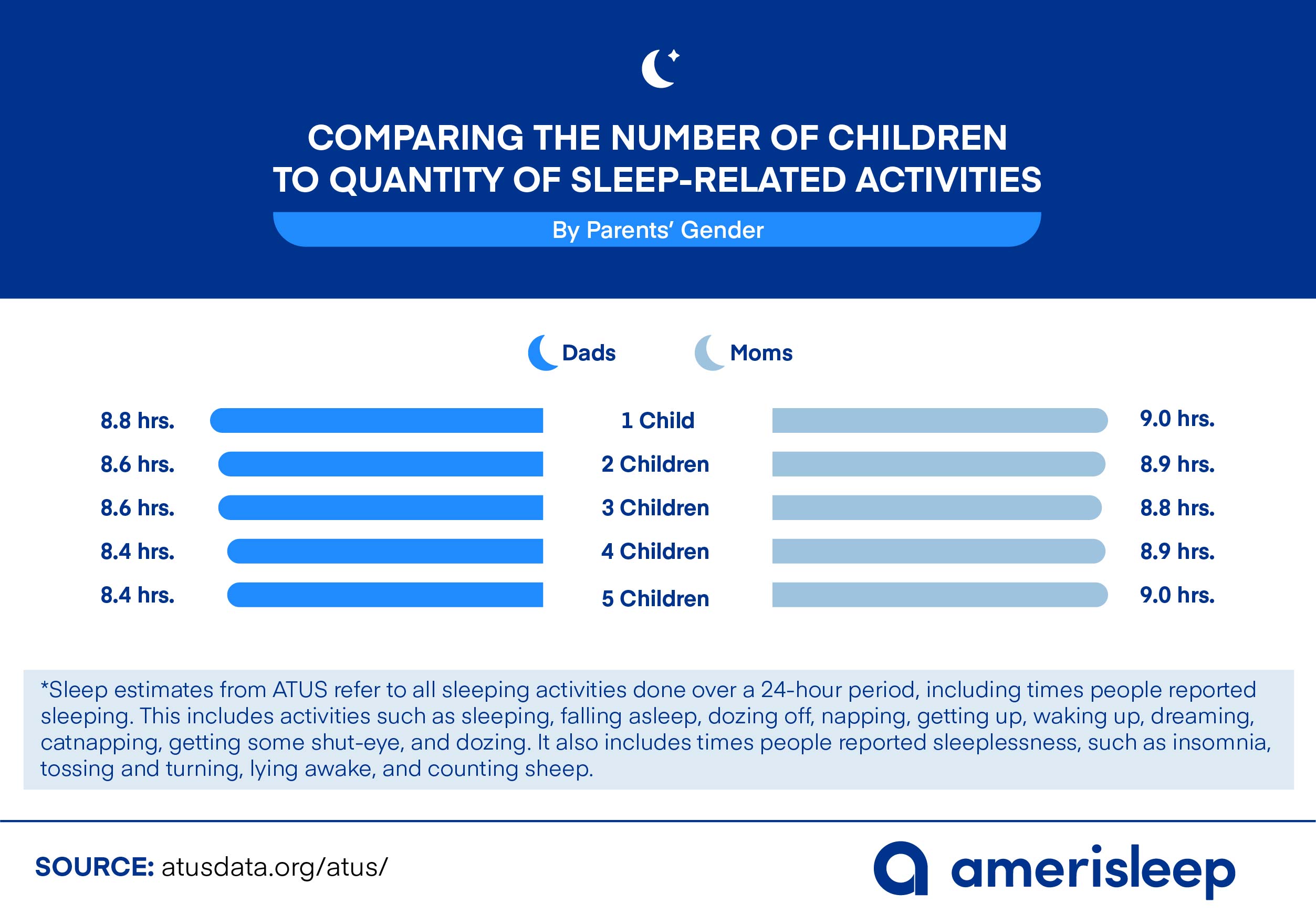
No matter how many kids they have at home, the average parent seems to get roughly the amount of sleep recommended by medical experts: eight to nine hours per day. Among parents with one to five children, moms reported slightly more sleep-related activity on average than dads, including napping, dozing off, and periods of sleeplessness. Women may have good reason to sleep slightly longer. One recent neuroscience study Verified Source National Sleep Foundation Nonprofit focused on educating about sleep health. View source concluded that women need more rest than men because they multitask more frequently, and this mode of cognition is especially taxing.
Among fathers, additional children seemed inversely correlated with average sleep times – although this effect was modest. The average dad with one child reported 8.8 hours of sleep-related activity per day, whereas the typical father of five got 8.4 instead. No equivalent pattern emerged among mothers. For example, moms with one and five kids reported the same amount of sleep-related activity on average. If parents with multiple children don’t seem to lose much sleep overall, it could be because they find getting adequate rest especially necessary. When meeting the demands of several kids daily, skimping on sleep may simply be out of the question.
Hours of Sleep Activities, by Age Range
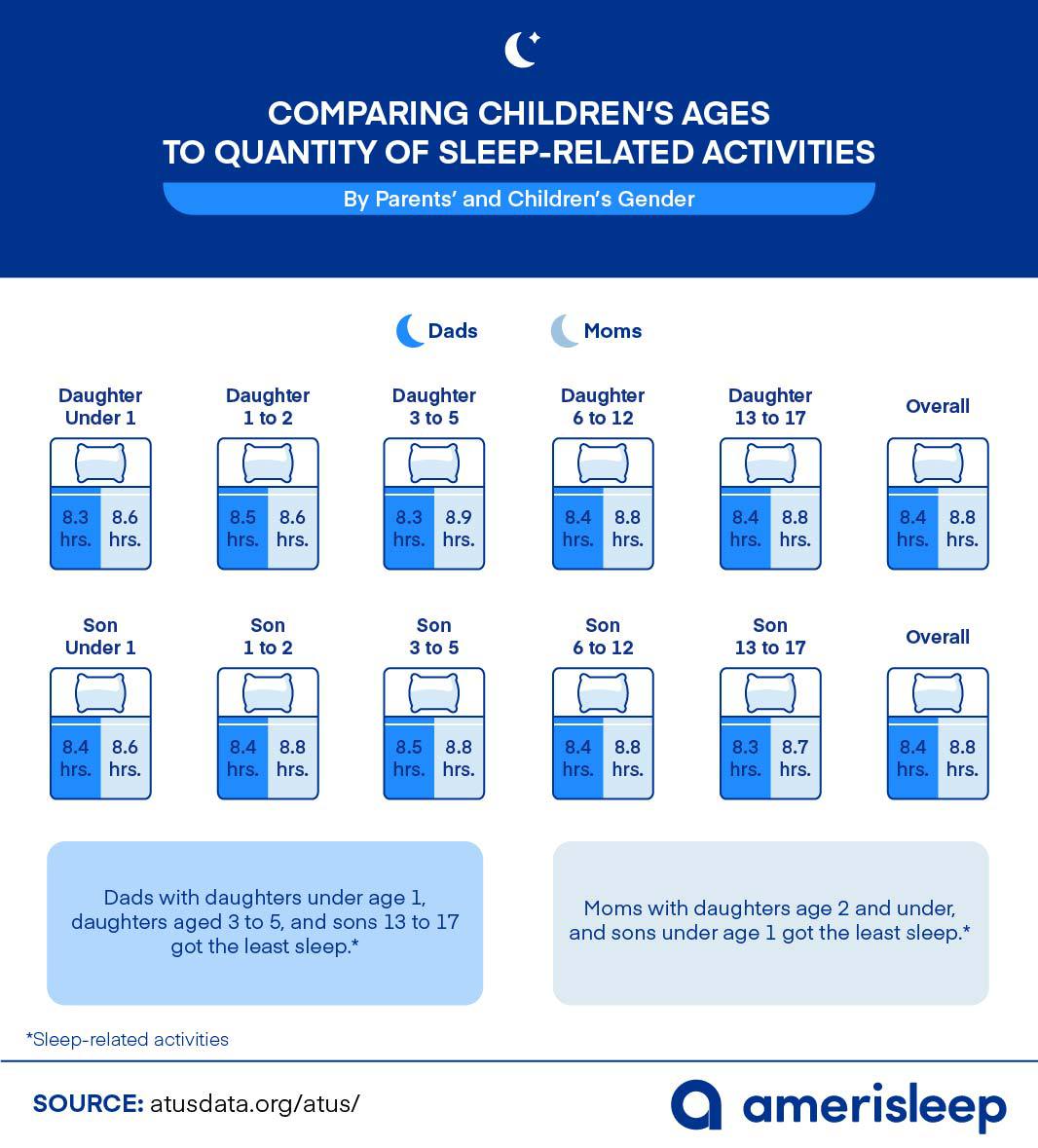
How might a parent and child’s respective gender influence sleep dynamics? For dads with daughters, the most sleep-deprived age ranges were when their child was younger than 1 and between 3 and 5. Moms with daughters reported the fewest hours of sleep-related activity when their little ones were 2 years and under. Among parents of sons, moms and dads alike slept relatively little when their kids were younger than 1. While most babies can sleep through the night Verified Source American Academy of Pediatrics (AAP) Professional society for pediatricians that aims to improve children’s health everywhere. View source by the time they reach age 1, parents of newborns can expect plenty of sleep disruption well into the first year.
Although parents of older kids generally slept longer, one interesting exception emerged: Among fathers with sons, the 13 to 17 age range seemed least conducive to sleep overall. A child’s gender seemed to have relatively little effect on the sleep-related activity of mothers and fathers. Among parents of sons and daughters, average sleep-related activity times were identical: 8.4 hours per day for men and 8.8 for women.
Rest vs. Responsibilities
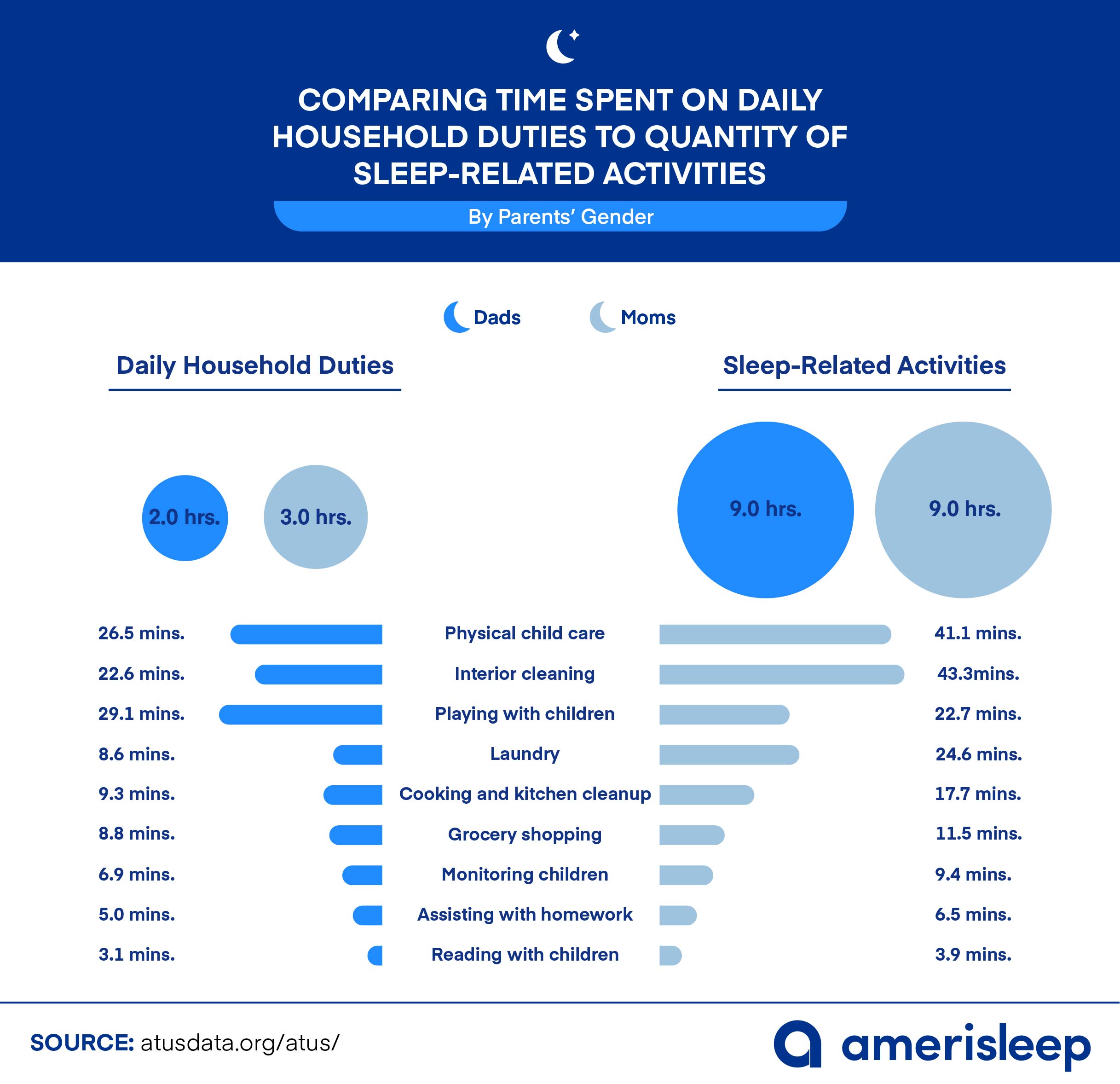
Perhaps mothers sleep more because their waking hours are more industrious. On average, female parents spent an hour more each day on household duties than their male counterparts. Our sleep data suggest an unappealing trade-off: With 60 more minutes of chores each day, moms reported just 12 additional minutes of sleep-related activity per day.
Some of the largest time differentials concerned the duties of domestic upkeep, such as cleaning and laundry. Moms also provided 15 more minutes of physical child care daily – although research indicates that fathers have become significantly more involved Verified Source Pew Research Center Think tank in Washington, D.C. that educates the public about current trends, issues, and attitudes. View source in recent decades. Dads did put in more time in at least one area: Playing with their little ones.
Employed and Exhausted?
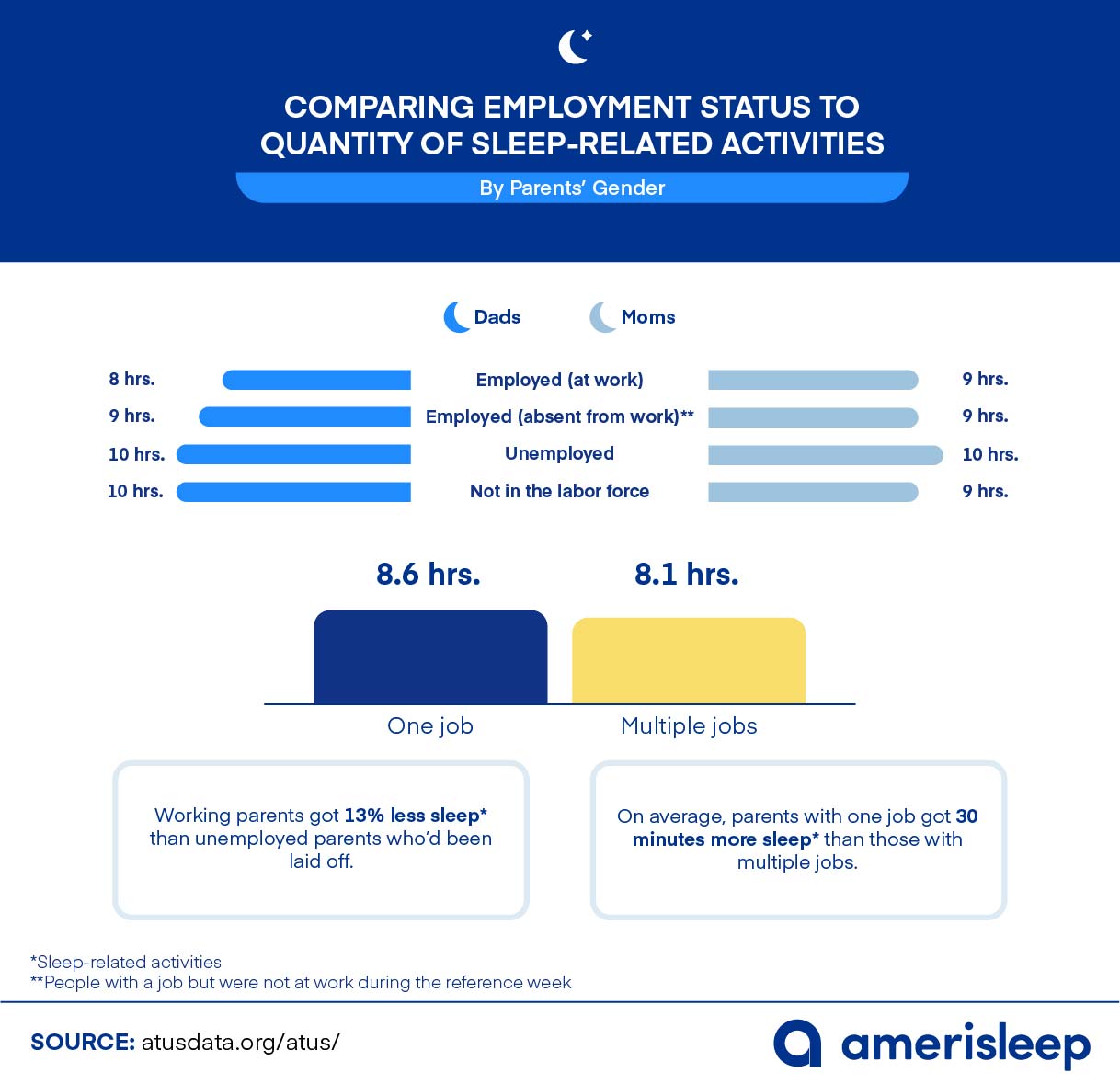
Ostensibly, work could be a major cause of parents’ sleep deprivation: Whether working a late shift or hustling into the office early, employment obligations can drive fatigue. Indeed, dads with jobs reported 1.3 hours less sleep-related activity than fathers who were out of the workforce or recently laid off. A similar pattern was evident among mothers, with working moms reporting half an hour less than peers who were out of the workforce, and a full hour less than moms who had recently lost their jobs.
If one job can cut into sleep time, it stands to reason that working multiple jobs simultaneously would further reduce one’s rest. The Bureau of Labor Statistics estimates that roughly 1 in 20 Americans works two or more jobs at once, and some pundits suggest the real figure could be far higher. Among those with multiple jobs, the average amount of sleep-related activity was 8.1 hours, or roughly 30 minutes less than those who had only one form of employment. In other words, parents with multiple jobs got less sleep, on average, than parents with newborn babies.
Sleep and Financial Strain
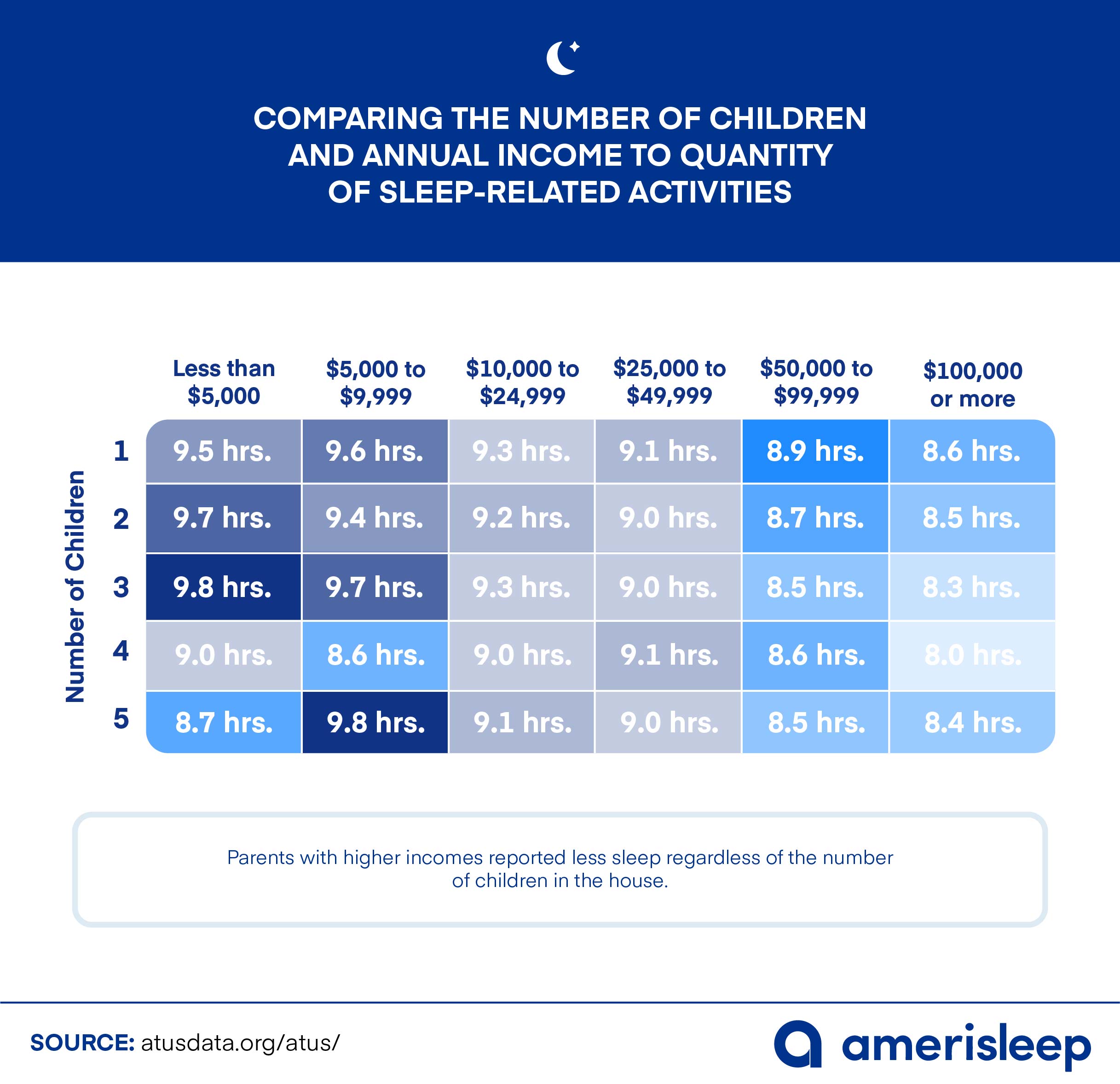
Parents who earned the least reported far more sleep-related activity than individuals with larger incomes. This counterintuitive trend could have a simple explanation: Parents with very small incomes may only work part time, pooling resources with their spouses or significant others. Yet, mothers and fathers making between $25,000 and $50,000 a year also slept quite well, getting at least nine hours of sleep-related activity per day, on average, irrespective of their number of children.
At the top end of the earning spectrum, parents with six-figure incomes got less than nine hours of sleep-related activity per day on average. One might attribute this finding to their job requirements. High-paying positions often entail long hours, and well-compensated individuals may be willing to sacrifice sleep to further their careers. But stress may also play a prominent role in keeping parents with large salaries up at night. In one recent study, 68 percent of individuals making $200,000 or more reported stress at work, a much higher rate than among middle-income professionals.
Sleep-Deprived Circumstances
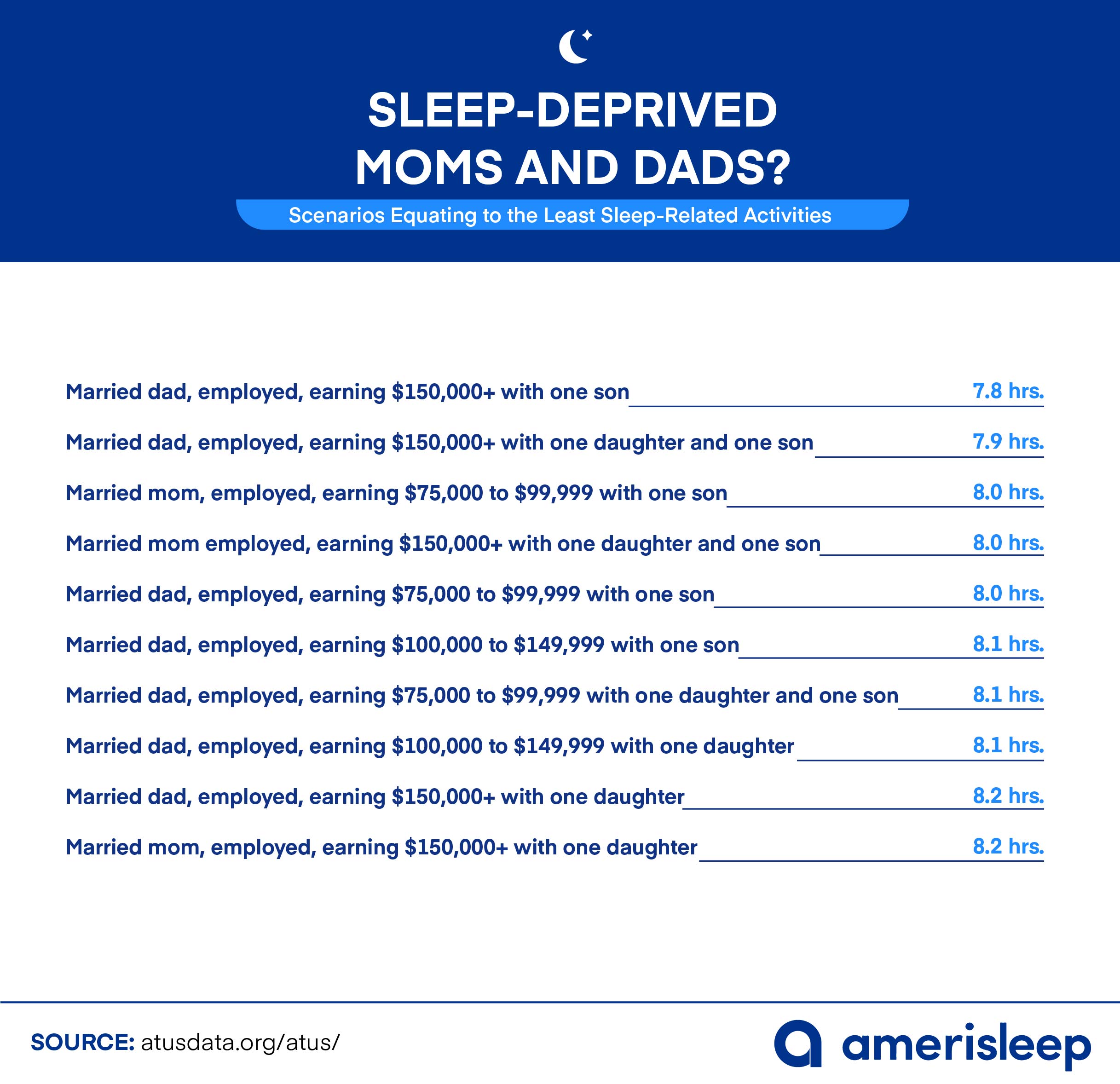
Delving deeper into the sleep patterns associated with various professional and parenting scenarios, we find that married parents with high incomes are often skimping on sleep-related activities. For example, married dads with an income of $150,000 or more and one son reported just 7.8 hours of sleep-related activity per day on average. Similarly, married moms making $75,000 to $99,999 with one son got less than eight hours a night. Married moms and dads who made $150,000 or more and had one son and one daughter also ran on relatively little sleep.
Once again, it’s notable that each of these sleep-challenged demographics earns at least $75,000 annually. Researchers report that higher incomes are correlated with increased happiness – but that connection fades past $75,000 per year. Perhaps sleep is an essential part of that equation: In pursuit of compensation, individuals forego rest necessary to their well-being. Our findings indicate that many parents with high salaries may be making that challenging choice.
Getting Rest to Be Your Best
Our findings confirm what many parents know already: When family obligations become overwhelming, sleep sometimes takes a back seat. Still, these data also suggest that many moms and dads across the economic spectrum are making time for the rest they need. After all, being a parent is often about being present, and it’s difficult to support your children and loved ones in a state of utter exhaustion. So if you’re a sleep-deprived parent, dedicate time to the shut-eye you need. When you take care of yourself for a change, the whole family will reap the benefits.
No matter how much time you commit to sleep, however, truly restorative rest is about quality as well as quantity. A night spent tossing and turning won’t help you meet the obligations of the busy day ahead. For an unparalleled sleep experience, consider Amerisleep’s best mattress, pillow, and bedding offerings, featuring eco-friendly materials and distinctive design. With products tailored to your specific needs, we’ll help you discover what’s best for your rest.
Methodology
To assess the sleep patterns of parents, we collected data from the American Time Use Survey (ATUS) from 2015 to 2017. The ATUS is a national sample of people aged 15 or older in private households (not nursing homes or institutions) and is drawn from a stratified three-stage random subsample of households that have completed the eighth and final wave of the Current Population Survey (CPS).
Limitations
Sleep estimates from the ATUS refer to all sleeping activities done over a 24-hour period, including times people reported they were sleeping and times they reported sleeplessness. This includes activities such as sleeping, falling asleep, dozing off, napping, getting up, waking up, dreaming, catnapping, getting some shut-eye, and dozing. It also includes times people reported sleeplessness, such as insomnia, tossing and turning, lying awake, and counting sheep.
Research has shown that the type of question a survey uses to measure the duration of sleep can have a significant effect on the estimates produced. The ATUS uses a time diary to collect information about how much time people spent on all activities, including sleep, on the previous day. Other sources for sleep estimates use stylized questions that ask specifically about the amount of sleep people “usually” get. BLS staff have been studying the differences between stylized and diary sleep measures and conclude there are several factors that may explain the differences. However, there is likely measurement error in both diary and stylized estimates. Research suggests that diary questions tend to yield higher estimates, while stylized questions tend to yield lower estimates. The actual duration of sleep likely falls somewhere in between.
Sources
- https://www.psychologytoday.com/us/blog/joyful-parenting/201702/the-surprising-effects-parents-sleep-deprivation
- https://www.atusdata.org/atus/
- https://www.sleepfoundation.org/articles/do-women-need-more-sleep-men Verified Source National Sleep Foundation Nonprofit focused on educating about sleep health. View source
- https://pediatrics.aappublications.org/content/142/6/e20174330 Verified Source American Academy of Pediatrics (AAP) Professional society for pediatricians that aims to improve children’s health everywhere. View source
- https://www.pewresearch.org/fact-tank/2019/06/12/fathers-day-facts/ Verified Source Pew Research Center Think tank in Washington, D.C. that educates the public about current trends, issues, and attitudes. View source
- https://www.bls.gov/opub/ted/2018/4-point-9-percent-of-workers-held-more-than-one-job-at-the-same-time-in-2017.htm
Fair Use Statement
Parents deserve a shoutout for their sacrifices, but also encouragement to take care of themselves as well. For these reasons, we invite you to share this project on any platform (for noncommercial purposes). When you do, please link back to this page to attribute our team for our work. Just like any mom or dad, we don’t do what we do for the credit – but it sure is nice to get it sometimes!
About the author
McKenzie Hyde is a Certified Sleep Science Coach and a full-time writer specializing in sleep health and the mattress industry. With a Master of Arts degree in literature and writing from Utah State University, McKenzie combines her passion for writing with her in-depth knowledge of sleep science. Her articles cover a wide range of topics, including best sleep practices for students, the consequences of sleep deprivation, and choosing the right mattress for back pain relief. McKenzie's dedication to delivering accurate and informative content makes her a valuable contributor to the field of sleep health.
View all posts